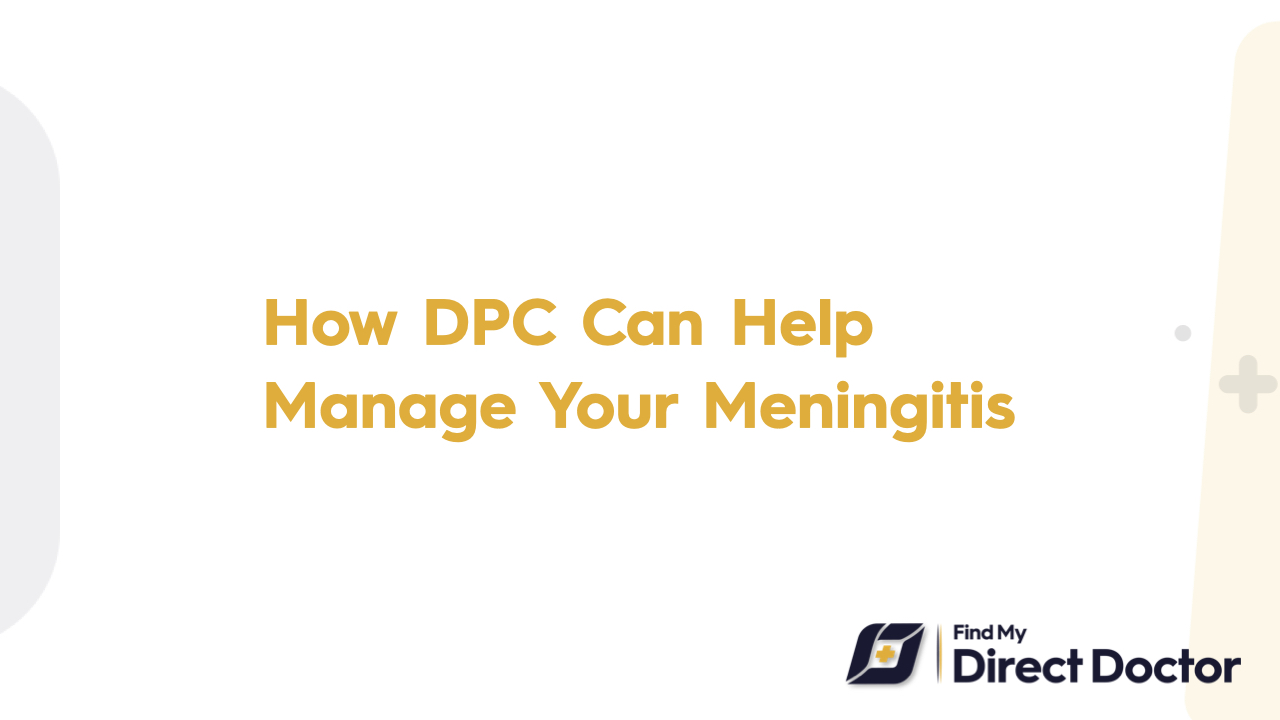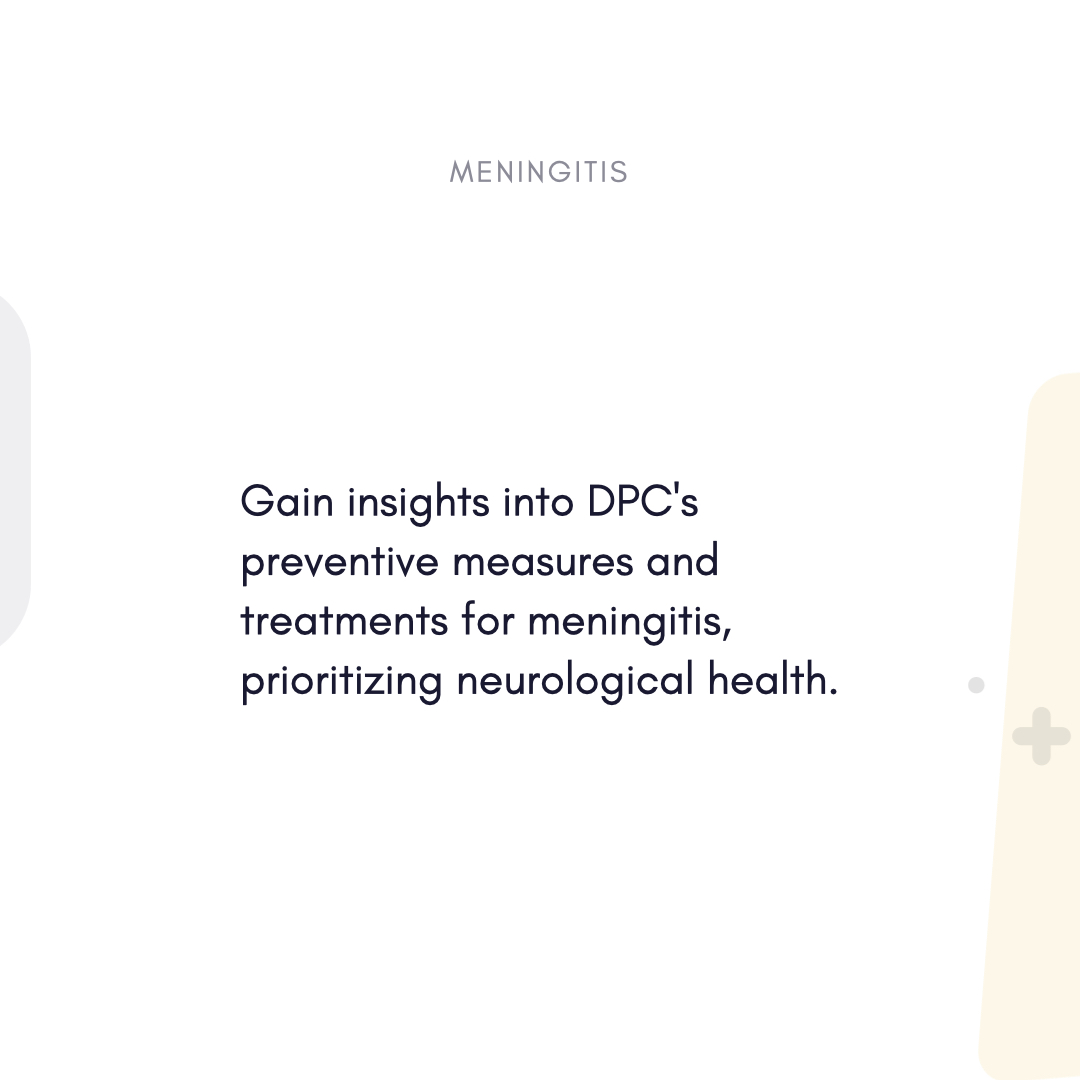Meningitis and Direct Primary Care (DPC): Timely, Personalized Care for Critical Infections
Imagine waking up with a sudden fever, a pounding headache, and a stiff neck making head turning intolerable. These might be indicators of meningitis, a potentially fatal infection of the brain and spinal cord membranes. Over 1.2 million persons worldwide suffer from bacterial meningitis alone annually; survival usually depends on the speed at which treatment starts. Under high pressure events like these, Direct Primary Care (DPC)—a membership-based healthcare model—can literally save lives. Let's see how DPC provides meningitis sufferers faster, more customized treatment.

Knowing Meningitis
Usually brought on by an infection (viral, bacterial, or fungal), menningitis is an inflammation of the meninges—protective membranes around the brain and spinal cord. Important indications include:
- High fever and chills
- Bad headache
- Stiff neck
- Vomiting or nausea
- Sensitivity to illumination
- Uncertainty or lethargy
Why then immediate care is so important? If treated, bacterial meningitis can be fatal in few hours. Complications including hearing loss, seizures, or cognitive problems could develop even in case of survival. Early diagnosis and antibiotics are stressed by the American Academy of Pediatrics as essential for lowering death and long-term damage.
DPC Changes Meningitis Management
Operating on a subscription model—usually 50–150 USD/month—Direct Primary Care (DPC) gives patients unlimited access to their physician for a set fee. Meningitis calls for a care team committed to your recovery, no delays in treatment, no surprise bills.
1. Quick Therapy and Diagnosis
DPC's same-day visits and direct lines of contact—that is, 24-hour phone access—allow for quick assessment of suspected meningitis. Doctors can:
- Check for meningeal irritation by doing quick physical exams to evaluate Kernig's or Brudzinski's symptoms.
- Order stat labs—such as blood cultures or CRP tests—at wholesale rates.
- Following infectious disease recommendations, give empirical antibiotics such as vancomycin or ceftriaxone while you wait for test results.
2. Organized, Affordable Treatment
- Bypassing insurance mark-ups on medications, imaging, or lumbar punctures, DPC clinics help to lower financial burden.
- Bargaining over hospital transfer or specialist consultation cash rates.
- Preventing pointless ER visits by means of proactive symptom control.
3. Individualized Prevention and Follow-Up
DPC providers concentrate on after stabilization on:
- Education: Instructing patients in early symptom recognition should help them should a recurrence arise.
- Ensuring at-risk people have current immunizations (such as meningococcal, pneumococcal vaccines) helps to prevent disease.
- Monitoring over long terms: Monitoring recovery and handling complications including memory problems or hearing loss.
Personal Success Stories from Real Life
- Case 1: During finals week Emma, 22, suddenly developed a fever and neck stiffness. Her DPC doctor ordered urgent bloodwork, saw her within hours, and began IV antibiotics. Early intervention allowed her to stay out of the ICU.
- Carlos, 34, suffered from repeated viral meningitis. By developing a customized plan including hydration strategies, stress-reduction techniques, and antiviral prophylactic measures, his DPC doctor reduced flare-ups by 80%.
Questions: Meningitis and DPC
- Q: How soon can DPC doctors begin treating meningitis?
- A: Straight away. DPC doctors give same-day evaluations top priority, and they usually start antibiotics or antivirals a few hours after symptom start.
- Given an emergency like meningitis, is DPC reasonably priced?
- A: Certainly. By skipping ER fees and inflated drug costs, members save 30–50% on average. Included in the monthly charge is critical care coordination.
- Could DPC manage cases of pediatric meningitis?
- A: Definitely. Many DPC providers partner with pediatric experts as needed and follow American Academy of Pediatrics guidelines for pediatric infections.
Why DPC Is a Meningitis Patient Lifeline
Managing high-stakes infections depends on patient-provider trust, which the American College of Physicians notes DPC's capacity to build. advantages include:
- Eliminating insurance waits guarantees faster treatment.
- One committed physician looks after your treatment from diagnosis to recovery.
- Customized plans help to lower recurrence risks by means of lifestyle changes and vaccinations.
Act Fast; Your Health Cannot Wait.
Meningitis does not offer second opportunities. With DPC, you have a healthcare partner who supports your well-being, moves quickly, and stays with you through each phase of recovery.






